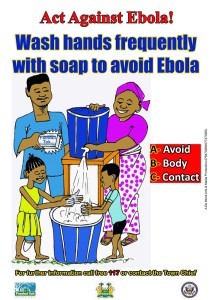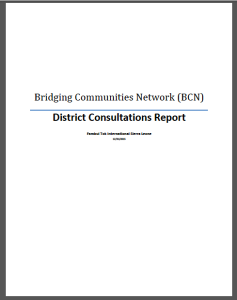“We are saying deal with Ebola in a way that structures will be in place to handle post-Ebola discussions because experience or history has taught us that Ebola – there’s always a possibility that it will come again. So how do we put in place structures in the communities, in the districts, in the villages, to ensure that if Ebola comes again, we’ll have structures in place to deal with that immediately and it will not get to where we are now.”
— John Caulker, Executive Director of Fambul Tok, on NPR Weekend Edition (November 1, 2014)
As the Ebola crisis has unfolded in Sierra Leone, we have implemented a multi-level response strategy designed to help meet immediate needs while also laying the groundwork for addressing the long term needs post-crisis. The 4 major components have been:
- strengthening local communities’ capacity for Ebola prevention,
- strengthening long term community capacity to deal with the social disruption caused by the crisis (the virus as well as the response efforts);
- strengthening community voices and representation in the national Ebola response more generally; and
- advocating for healthier relationships between local leaders and their outside supporters, including donors, so that the global Ebola and post-Ebola response leaves the country stronger in facing the next crisis, rather than fostering long-term donor dependence.
I. Strengthening community-level prevention efforts: We continue to partner with Fambul Tok, whose staff and volunteers have doubled and redoubled their efforts to respond to the crisis in practical and meaningful ways. They have led community education and prevention efforts since the beginning of the outbreak last spring, when they were one of the first national organizations to embrace this work.
 Fambul Tok has worked closely with the District Health Management Teams (DHMTs) to reach rural communities and teach people how to stop the spread of the virus. Because of their groundbreaking grassroots peacebuilding efforts they have the asset most needed to do this successfully – the trust of the people of Sierra Leone. As a result, these critical messages are heard, and heeded, in even the most remote villages, where others have been met with suspicion and distrust.
Fambul Tok has worked closely with the District Health Management Teams (DHMTs) to reach rural communities and teach people how to stop the spread of the virus. Because of their groundbreaking grassroots peacebuilding efforts they have the asset most needed to do this successfully – the trust of the people of Sierra Leone. As a result, these critical messages are heard, and heeded, in even the most remote villages, where others have been met with suspicion and distrust.

Of particular note has been the Peace Mothers soap making and distribution campaign. To keep Ebola from spreading, hands and surfaces must be washed constantly. But in many of the rural villages, critical prevention tools like soap, bleach and buckets are luxuries. Many of Fambul Tok’s Peace Mothers already make soap in local collectives as part of their community rebuilding initiatives. Seeing the national need, they began ramping up their production and distribution efforts to help keep their people safe.
Peace Mothers-produced soap is being distributed free of charge to villages in Fambul Tok’s network (now numbering over 2,500), and Fambul Tok has been working to educate these communities on Ebola prevention techniques. The locally-led model has been so successful, that it has been replicated by other organizations nationally.
You can watch a short film that gives a powerful window into the Peace Mother’s work here.
II. Strengthening long term community capacity to deal with the social disruption caused by the virus and by the response efforts: We continue to support Fambul Tok in delivering upon their core mission of community healing and reconciliation, even during the countrywide lockdown. Not only has the need for post-war community healing continued – and Fambul Tok has persisted against all odds to ensure this work continues – but new reconciliation needs have emerged as a result of the Ebola crisis. Fambul Tok is rising to this challenge, and has marched into 2015 with new resolve and a strengthened program to prepare communities to respond constructively to this new set of challenges.
BUILDING STRATEGICALLY FOR LONG TERM CHANGE AND IMPACT
In addition to these targeted efforts to build local capacity to prevent and respond to Ebola, we have seen the need and the opportunity for a more strategic, systemic change—and we have stepped up to the challenge.
III. Strengthening community voices and representation in the national Ebola response: It became clear early in the crisis that the national and international response was focused on treating the virus, not on strengthening community capacity for preventing its spread. It also became clear that doing the latter would require building bridges of connection between the local communities and the national Ebola response efforts, bridges that did not currently exist.
 Toward that end, we actively supported the creation of the Bridging Communities Network, a network of national Non-Governmental Organizations and Community Based Organizations, which has mobilized and coordinated a nationally-networked, community level response to the Ebola crisis. The nationwide community consultation that launched their work yielded a powerful report and substantive contribution to the national Ebola response process by virtue of comprehensively bringing community voices for the first time.
Toward that end, we actively supported the creation of the Bridging Communities Network, a network of national Non-Governmental Organizations and Community Based Organizations, which has mobilized and coordinated a nationally-networked, community level response to the Ebola crisis. The nationwide community consultation that launched their work yielded a powerful report and substantive contribution to the national Ebola response process by virtue of comprehensively bringing community voices for the first time.
IV. Advocating for healthier relationships between local leaders and their outside supporters: And now, we want to use our experience, our lessons, our resources and our voice to contribute to the post-Ebola international response in Sierra Leone building on the lessons of the post-war period. Under the leadership of CFP Senior Fellow John Caulker, the founder and Director of Fambul Tok, we are launching a national dialogue to help forge healthy and productive partnerships involving stakeholders at all levels to support the post-Ebola recovery program, to ensure it is built for long term success and sustainability and with local communities at the center. More information on this dialogue to come.
Blog banner image (c) Sara Terry for Catalyst for Peace

